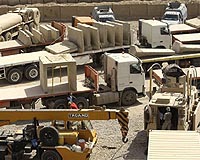| . |  |
. |
Baghdad (AFP) March 21, 2010 Prime Minister Nuri al-Maliki's calls for a recount of votes from Iraqi polls two weeks ago were rebuffed on Sunday by the election commission amid a tight race to form the biggest bloc in parliament. Maliki's about-face from previous remarks that complaints over the March 7 general election would not affect the results was condemned by the Iraqiya bloc which is now nudging ahead of the premier's State of Law Alliance. Results from the vote, the second since Saddam Hussein was ousted in the US-led invasion of 2003, come less than six months before the United States is due to withdraw all of its combat troops from Iraq. Latest figures from the election commission based on 95 percent of ballots cast showed State of Law trailing the Iraqiya bloc of secular former premier Iyad Allawi by around 11,000 votes nationwide. In a statement, Maliki urged the election commission to "immediately answer the demands of political parties to proceed with a manual recount" which he said would "protect political stability... and prevent a return to violence." The statement, which pointedly noted that Maliki remained head of the country's armed forces, did not specify whether he wanted a nationwide recount, or in particular provinces only. It differed markedly from Maliki's own comments just a week ago, when he said election complaints "cannot affect the results." Hundreds of people demonstrated in support of Maliki in the holy city of Najaf as 10 provincial governors -- all State of Law -- issued a statement also calling for a recount. In his own statement, President Jalal Talabani also called for "a new manual recount" in some provinces, without specifying which ones. The Independent High Electoral Commission (IHEC) rejected the demands for a manual recount, however, saying it would take "too long." "We have provided all political entities with CDs with the results of counting at the political centres, after thorough checks on our part," commission chief Faraj al-Haidari told AFP. "If they have doubts and think that there are errors, they can ask us to hold recounts at particular centres, but not across all of Iraq." Haidari later told a news conference at IHEC's data entry centre in Baghdad's Green Zone: "Some people have demanded a new count for an entire city or across the country -- this is like saying we need a whole new election. "If you do not believe in modern technology, how would you have confidence in the pen of a public worker?" Senior Iraqiya candidate Intisar Allawi, a relative of the bloc's leader, denounced Maliki's remarks as a "clear threat against the commission," adding that a manual recount was a "contradiction" fuelled by news that Iraqiya had taken the lead nationwide. Although she declined to say a manual recount was unnecessary, she said such action "would mean a delay of the results for several months." "This would lead to a political vacuum that would affect the security situation." IHEC officials and Western diplomats have downplayed allegations of fraud and pleaded for patience as the count, which has so far taken two weeks, continues. Final results are due to be published on March 26. Figures released on Saturday showed Iraqiya garnered 2,631,388 votes compared with State of Law's 2,620,042 -- a difference of 11,346. The nationwide count is an indication of the tight race between the two main rivals, but it was not immediately clear how their tallies would affect the number of seats they win in parliament. Maliki's bloc currently leads in seven of Iraq's 18 provinces, including the single largest Baghdad and six other mostly Shiite southern provinces. Allawi, meanwhile, is ahead in five mostly Sunni provinces but looks likely to win several seats in Shiite areas. Iraq's proportional representation system makes it unlikely for any single group to clinch the 163 seats required to form a government on its own. Security officials have warned that protracted coalition building could give insurgent groups and Al-Qaeda a chance to further destabilise Iraq, fears that were illustrated by attacks on Sunday that killed six people nationwide.
Share This Article With Planet Earth
Related Links Iraq: The first technology war of the 21st century
 Iraq PM, ex-premier in tight race for parliament
Iraq PM, ex-premier in tight race for parliamentBaghdad (AFP) March 18, 2010 Iraqi Prime Minister Nuri al-Maliki and rival Iyad Allawi were locked in a close election race, running neck-and-neck for seats in parliament with nearly 90 percent of ballots counted on Thursday. Maliki's State of Law Alliance led secular ex-premier Allawi's Iraqiya list by just 40,000 votes nationwide, according to latest results based on 89 percent of ballots counted. But Iraqiya was ... read more |
|
| The content herein, unless otherwise known to be public domain, are Copyright 1995-2010 - SpaceDaily. AFP and UPI Wire Stories are copyright Agence France-Presse and United Press International. ESA Portal Reports are copyright European Space Agency. All NASA sourced material is public domain. Additional copyrights may apply in whole or part to other bona fide parties. Advertising does not imply endorsement,agreement or approval of any opinions, statements or information provided by SpaceDaily on any Web page published or hosted by SpaceDaily. Privacy Statement |